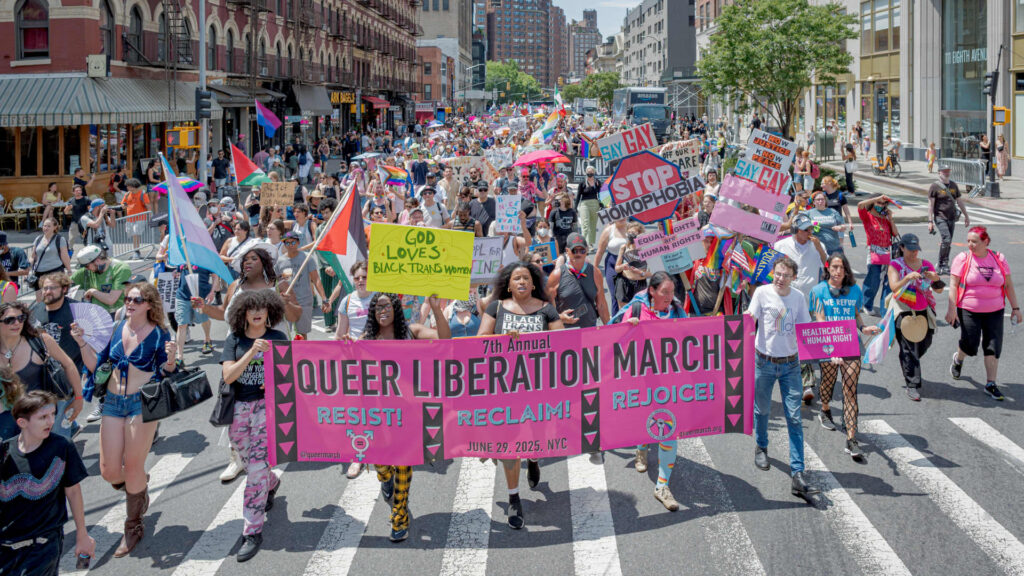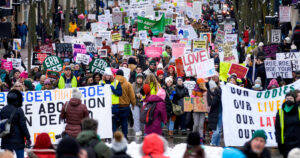
Participants marched in the Reclaim Pride Coalition’s seventh annual Queer Liberation March in New York on June 29, 2025, showcasing a vibrant celebration of identity and rights. However, beneath the surface, a growing number of international LGBTQ+ travelers are reconsidering their trips to the United States. This shift is driven by a combination of political tensions and increasing anti-LGBTQ+ rhetoric.
Canadian citizen Robert Sharp had planned to visit Provincetown, Massachusetts, a renowned LGBTQ+-friendly destination, for a friend’s milestone birthday. Yet, against the backdrop of President Donald Trump’s tariff policies and a rise in anti-LGBTQ+ sentiments, Sharp and his group decided to cancel their trip, opting instead for Montreal. “Do we want to have that stress before going on vacation? Or do we want to support our own country?” Sharp pondered. This sentiment echoes a broader trend among international travelers who are re-evaluating their travel plans to the U.S.
Impact on U.S. Tourism
The decline in international travel to the U.S. is evident in the numbers. According to the International Trade Administration, the number of foreign visitors arriving by air dropped 10% in March compared to the previous year. When including land border crossings, inbound visitors fell 14% during the same period. This decline is attributed to negative perceptions of the U.S. tied to trade and immigration policies, leading travelers to consider other destinations.
Oxford Economics forecasts a significant financial impact, estimating a decrease of $8.5 billion in spending by international visitors to the U.S. this year. Among the LGBTQ+ community, this trend is particularly pronounced. The LGBTQ+ travel platform misterb&b reported a 66% decline in bookings from Canadian users and a 32% decline from European users between February and April, compared to the same period last year.
“LGBTQ+ individuals appear to be continuing to spend on vacations, but they’re changing their destinations,” said Matthieu Jost, CEO of misterb&b.
The Rainbow Dollar’s Influence
Sharp, who owns the LGBTQ-friendly travel company Out Adventures, is not alone in his decision to change travel plans. In February, the LGBTQ+ advocacy group Egale Canada announced that its members would not participate in U.S.-based conferences or events this year, including WorldPride in Washington, D.C. This decision was made to prioritize safety, as explained by Helen Kennedy, executive director of Egale Canada.
Under Trump’s administration, several executive orders have targeted transgender individuals, preventing them from serving openly in the military and restricting their participation in sports. These policies prompted several countries, including Denmark, Finland, and Germany, to issue travel advisories for LGBTQ+ travelers visiting the U.S., particularly transgender travelers.
Canada has also updated its travel guidance, advising individuals with an “X” gender marker on their passports. Kennedy emphasized the economic implications of these policies, noting that members of Egale Canada typically spend between $3,000 to $5,000 per person on trips to the U.S. for conferences or events.
“When you put that human element with the economic element, then you think, well, OK, why would I go there?” Kennedy remarked.
LGBTQ+ Market Significance
The purchasing power of LGBTQ+ consumers is substantial, estimated at $1.4 trillion, according to a 2022 study by Pride Co-Op. In 2023, the global LGBTQ+ tourism market was valued at $296.8 billion, with projections to more than double in the next decade. Research from Arival Travel highlights that LGBTQ+ travelers are often more affluent, with household incomes exceeding $150,000, and they tend to spend more on activities and tours than other travelers.
John Tanzella, CEO of the International LGBTQ+ Travel Association, noted a growing hesitation among international members to attend the organization’s global convention in Palm Springs, California. “They don’t feel welcome here, so why come and spend their money here?” Tanzella questioned.
Future Implications and Community Resilience
The implications of this trend extend beyond the travel industry, affecting local economies that rely on tourism. “On the surface, it affects airlines and hotels. But if you dig a little deeper, it does affect other businesses, whether it’s barber shops or restaurants, bars, spas,” Tanzella explained. Many communities depend on tourist dollars to thrive.
Despite these challenges, Pride celebrations continue to carry on, serving as a testament to the resilience and vibrancy of the LGBTQ+ community. As the world navigates these complex political landscapes, the travel decisions of LGBTQ+ individuals reflect not only personal choices but also broader statements of activism and support for inclusive destinations.
As the situation evolves, the travel industry and policymakers will need to consider these dynamics to foster environments that are welcoming and supportive for all travelers.






